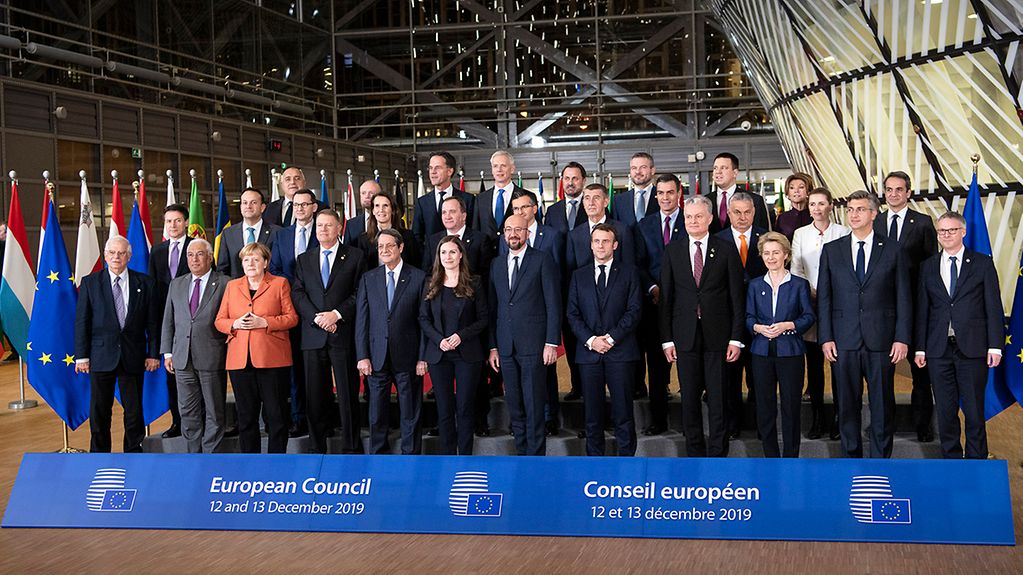Summit in Brussels
The EU heads of state and government met in Brussels and agreed to achieve climate neutrality by 2050. At the end of the summit, Federal Chancellor Merkel spoke of a “milestone in European climate policy”. Following elections in Great Britain, Brexit and future relations with Great Britain were also on the agenda.

The EU heads of state and government.
Photo: Bundesregierung/Bergmann
There has been a very intensive discussion on the subject of climate protection, said Federal Chancellor Merkel at the end of the two-day consultations in Brussels. “It is clear to us all, of course, that we have a considerable amount of work to do.” Nevertheless, said Merkel, this resolution with its fixed objective of achieving climate neutrality by 2050 is "a milestone in the issue of climate protection in the European Union”.
The vision of the “Green Deal” proposed by EU Commission President von der Leyen is very challenging, continued Merkel. The "Green Deal” involves far-reaching changes for every national economy, she said. The focus has to be on innovation, growth and technological solutions, she added.
By 2050, Europe is to be the world’s first climate neutral continent. This is one of the most important political projects of the new EU Commission under Ursula von der Leyen. It was only on Wednesday that von der Leyen had presented what she called her “Green Deal” to the European Parliament. It sets out the route for future EU climate policy.
Initially without Poland
Poland is the only member state that has not yet been able to commit to implementing the objective of climate neutrality. The European Council will therefore return to the subject once again at its summit in June 2020.
After the consultations on climate protection on Thursday evening, Federal Chancellor Merkel stressed the following with regard to Poland's hesitant position: "Europe is not split into different parts, rather there is one member state that needs a little more time to consider how it will implement it.” She is confident, however, that they will be able to come to an agreement.
Brexit - close link remains
On Friday, the heads of state and government discussed Brexit as the “EU 27” – without Great Britain – together with EU negotiator Michel Barnier. In Great Britain, the day before, the Tories had won the House of Commons elections with a large majority.
The Federal Chancellor congratulated British Prime Minister Johnson on his “outstanding election victory”. This should make it clear that the withdrawal agreement negotiated by the British government and the EU can be adopted, she said. Now we can turn to negotiations on future relations, she added. These will be “complicated enough”.
Merkel seemed convinced, however, that the EU will continue to negotiate with Great Britain “with great consensus” and “with great enthusiasm”. We want to have a special partnership with Great Britain, she said. Though Great Britain is a non-member state, “it is a country with which we are linked in very many ways”.
You can find more information on Brexit here.
Multiannual Financial Framework
On the first day of the summit, the heads of state and government also spoke about the Multiannual Financial Framework, MFF for short. An issue that is closely linked to that of climate protection. It concerns the annual maximum amounts that the EU can spend on individual policies, specifically in the period 2021 to 2027.
The current Finnish Council Presidency had submitted proposals to the European Council as the basis for the discussion. Due to the great need for debate and the varied interests of the individual member states, no conclusive agreement was reached in Brussels. The heads of state and government have now instructed the President of the European Council, Charles Michel, to take over the negotiations. These are to be concluded as quickly as possible. Only after this can new funding programmes be initiated.
Conference on the future of the EU
The European Council also considered the issue of the future of the EU at the suggestion of Commission President von der Leyen. The project envisages a two-year process in which EU citizens, civil society and European institutions consult together on the future of the European Union. National parliaments are to be involved in this, too. The future Croatian Council Presidency is to continue developing this project.
Other issues
Sanctions against Russia: On Thursday evening, Federal Chancellor Merkel and French President Macron reported on the results of the Normandy summit held last Monday in Paris. Progress was made, but not enough to lift the sanctions against Russia, according to Merkel. As a result they unanimously agreed to extend them.
Eurozone summit: On the second day of the summit, EU Council President Michel invited members to a eurozone summit. There, Eurogroup President Mario Centeno reported on the current situation. Also present was Christine Lagarde, new President of the European Central Bank since 1 November 2019. Lagarde provided an assessment of the economic situation. The eurozone budget, the ESM and the banking union were also discussed.